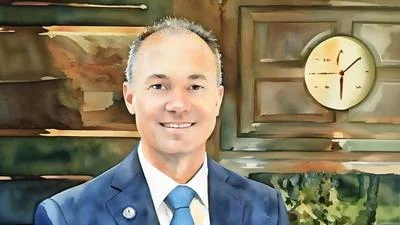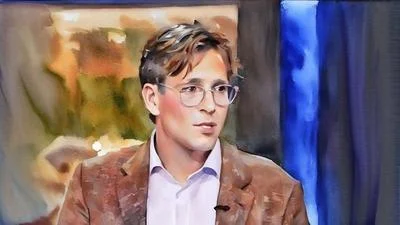Bob Levey is a prize-winning journalist who has covered the Washington scene since the Johnson Administration. He is the author of Larry Felder, Candidate.
Federal Newswire:
How has Washington changed from your perspective?
Bob Levey:
My gosh, you don't have enough time for me to get deep into that answer, but I think in three major ways.
First, the local city is now a much more cosmopolitan place than it ever was when I got here.
Second, the role of Congress has completely changed. Congress used to be--because the Constitution says it should be–the dominant force in Washington, D.C. Today, I can't think of one single thing to say about Congress that is positive. They are neutral, or else they are at the extremes and they don't get anything done.
Number three is the international arena, of course. Washington is world famous for this.
One of my favorite Washington stories has to do with the ambassador of France who came to Washington in the early 19th century and immediately petitioned his home government for hazard pay because he was serving in this desperately underfunded world capital called Washington.
Today the international community has proliferated. There are many more nations. The international community is a little less influential with our government than it once was. There's a lot of ‘make nice’ diplomatic receptions around town, that will always happen. Most of that is all about getting caterers rich. I don't think it actually achieves very much in terms of world peace or world influence.
Federal Newswire:
Do you still get a little misty-eyed when you go downtown and see the monuments and capitol?
Bob Levey:
I definitely get that way in part because I get a lot of dust in my eyes when I walk down Pennsylvania Avenue. That makes me misty-eyed every time.
But I believe in this country, I believe in our constitution, I believe in our system. And what I don't believe in are people who refuse to understand it, who refuse to learn it, and who think they can bend it to their will and they're all over the place.
Federal Newswire:
What’s your daily column, Bob Levey’s Washington, about?
Bob Levey:
After writing 5,411 columns on deadline across nearly 25 years, I am living proof that anybody can do anything if they drink enough coffee.
That truly was my raison d'être and my success. I could never have done it without energy burst. I could never have done it without a lot of help and without a lot of ideas. But I also could never have done it if there were not a Bob Levey's Washington to write about.
Even here, certainly out in the country and out in the world, people think, "Oh, Washington's just this theme park and the only thing that ever happens here is the federal government." I wrote all of those columns based on the idea that there was a there, there.
People say, "Well, what was your column about?" Well, it was about music and elevators on K Street, but never about what they talked about in the law firms on K Street. My column was about parking tickets, love in the office, schools, the famous athletic rivalries between two local high schools.
Funny story, if I may.
When I was all of 23 years old, the Washington Post sent me to cover the Johnson White House on weekends. I thought I was pretty snazzy stuff. 23 years old, I'm covering the most important person in the world. I hated it.
All they do is coop you up in the East Wing and you never can talk to anybody. You have no sources, you have no access. That's not what journalism is.
After four months, I asked off of that beat, and [Ben] Bradley gave me a look that I will never forget. He said, "There's only one story in this town, man." I said, "Well, I don't agree, and I think I'm going to go and find a lot of them in local Washington." I did.
Federal Newswire:
Do you think you proved Ben Bradley wrong? Which is no small feat.
Bob Levey:
No small feat. I don't think I ever did again. But hey, I'll take one.
Federal Newswire:
What kind of work goes into journalism and how have things changed?
Bob Levey:
Well, this is always going to be an industry for hard workers and hard work. Definitely then [and] it still is today. Maybe even more so today because of the electronics where today's White House correspondent is not just filing one story to one newspaper. At the end of the day, he's tweeting all day long. He's on radio and television.
If I can be a captive of my generation–he's like one of those old folk singers in the '60s who would come out with an acoustic guitar, a mouth rack so he could play the harmonica, a set of drums at his feet, and he'd do all of these things at the same time.
That's what journalism is today, for better or worse.
Federal Newswire:
Is the newly branded 24 second news cycle problematic?
Bob Levey:
This is the most complicated business problem I have ever seen because on the one side we have more educated people in our world than ever before. We have more discerning people than ever before. We have people who really do understand if you get them alone and you talk to them a little bit, that the truth is not simple.
That deep journalism is where you're going to learn the truth, and to get deep journalism and to read and listen to deep journalism, it takes time. What happens here in our culture more and more is that nobody thinks that anything that takes time is worth anything.
If you can't get it in 280 characters or you can't get it in a sound bite, or in a comment underneath a news story, then it's worth nothing. In fact, the opposite is true. The deeper journalism I think is as good as it's ever been, probably better than it's ever been. It's in some ways dying on the vine because of the economics of the profession.
If journalism is a deal between the journalist and the consumer, and if people don't want deeper journalism, they aren't going to get it.
Federal Newswire:
How did you approach your work on the radio?
Bob Levey:
I thought that talk radio was the perfect town square. I still think it could be where you welcome anybody in with anything to say, and the host doesn't set themselves up as God Almighty or an Oracle or the only source of truth. You get on the air and you say, "Hi there folks, for the next couple of hours we're going to have a roundtable discussion about this and that." What I always said on every one of my radio shows was this, "If you're not careful, you might learn something."
Federal Newswire:
Do we have a problem today with coming into conversations with presuppositions about others?
Bob Levey:
We do. We also have to stop pigeon holding people and just reducing them to, "Oh, you’re blue. Oh, you're red." People are very complicated creatures. You may have noticed that. The fact that they are complicated, it should be respected.
Just yesterday I was in an airport with a guy and he took a look at me. This happens to me a lot when I'm flying back to Washington, people look at my hair and they say, "Are you a senator?" I deny it, but then they want to talk to me anyway.
This guy says to me, "Are you worried about America?" We're sitting in the departure lounge in the New Orleans airport.
I said, "Yeah, I'm worried about America. I'm very worried about the First Amendment, freedom of speech, that people cannot speak their minds on college campuses, and the way freedom of the press is distorted for various other purposes."
If anything is going to sink the country, and I'm not a prophet of doom here at all, it's going to be the erosion of those two freedoms.
Federal Newswire:
Are you referring to situations like when an ACLU event was shut down by anti-ACLU protesters because they were defending free speech?
Bob Levey:
That's exactly what I'm talking about. You could substitute either side of the political equation and have the same point. It's really dangerous.
Free speech means free. I tell my students, for example, about the First Amendment, and they say, "Oh, well that means you can publish anything you want." It does not mean that.
Responsible press is necessary and edited press is necessary. But the First Amendment is so widely misunderstood and it's so widely misapplied that we're going to get in trouble here.
Federal Newswire:
How should this apply to the Internet?
Bob Levey:
The most amazing invention of our lives, the internet. There are no guardrails. There is nobody filtering, there is nobody censoring. Anybody can say anything.
I don't know if you've ever talked to a lawyer, about whether you could collect a cent from somebody who gets libeled or slandered on the internet. Oh, you can't.
So it's this free fire zone of anything goes. A lot of people would say, "Okay, cool. That's great. That's what freedom means." I'm much less sure of that.
I think the internet is, well, I always say it's like a raging river after a big rainstorm, here comes a tree stump and here comes some mud and here comes a washing machine. Then, oh, look, there's a flower. Once in a while there's something good in all of this wild freedom. But just as often there is something bad.
Federal Newswire:
You wrote a book called Larry Felder, Candidate that was written before the pandemic? Do you think you'd take a different tack if you'd written it after the pandemic?
Bob Levey:
Oh no, not at all. Because it's a novel. This is not the ultimate journalist reporting, but it's a book about my twin passions, politics and journalism. The plot is really very simple.
Larry Felder is a famous Washington newspaper columnist who abandons journalism to run for Congress in the suburbs of Washington. I'm not going to give it away, but all kinds of stuff happens to poor Larry. Love happens and corruption happens and the unexpected happens. He falls afoul of those nasty media years known as newspaper reporters. But the good guys win in the end.
I want to reassure you and everybody listening that I am not Larry, and Larry is not me. I would never abandon journalism. I would never run for Congress or for anything else. I'm either too smart or too dumb.
Federal Newswire:
If governments are allowed to pick the winners and losers, do you think that gives way to opportunities for corruption, like bribes, in government officials?
Bob Levey:
Or not even bribe them. Just take them to a fancy dinner or support their campaigns or give money to their PACs or do all of the things that are not only legal, but that are everyday occurrences in our politics.
Yes. I'm saying that money corrupts absolutely. And that it absolutely has corrupted our system.
Federal Newswire:
Do you believe social media prevents us from having conversations with each other?
Bob Levey:
I think the preponderance of social media has led to a kind of social stunting.
The most amazing news story I have read in the last six months… the New York Times reports that 15 year old boys no longer know how to ask a girl for a date. They ask her by text message.
Well, I'm not going to say I was the most successful 15 year old asker-of-dates in the history of the world, but hey man, I would march up to the girl and say, "Do you want to go to the dance with me?" I wasn't going to use some machine to do it. What has happened to this world?
Federal Newswire:
Are you troubled by the stunting of socialization resulting from Covid and the lockdowns?
Bob Levey:
You should be [troubled] in many ways, not just because it'll mean that there are fewer dates on Saturday night, but I think this carries over into the business world. It certainly carries over into the political world.
My gosh, if I watched the Jan. 6th hearings and every single one of those staff members behind the congressmen had their faces buried in a phone the whole time. Why don't they listen to what's going on?
Federal Newswire:
How do folks find the book and what you’re up to?
Bob Levey:
I have my own sales website for the book, and people are encouraged to go there and to tell all 10,000 of their closest friends to go there. The site is bobleveypublishing.com.
You can find out all about the book there, order the book there, and to some degree there, you can find out what I'm up to.
But the best way to find out what I'm up to is just to take one of my classes at Politics and Prose Bookstore, or to just find me via Bob Levey Publishing and I'll be glad to fill you in on the other.









